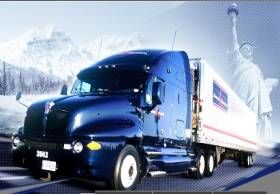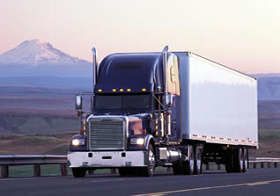Please Help? Need Advice.
Topic 28999 | Page 2

Please check out my local rookie video
There are things to know....such as it could be 14 hour days plus the commute and you only get 10 hours off including the commute. Which means if you live an hour away...you only get 8 hours to sleep shower see family and eat. Plus much of it is back breaking work (im old and past that lol) plus these are high demand jobs so could be scarce....not to mention can be in really tight areas requiring great skills you wont have for awhile.
Considering Local Driving as a Rookie?
After reviewing the different posts on whether to start locally or over the road. i have been leaning more over the road because of the experienced gained, quality training, and more hands on experience. The only thing that was holding me back was family and being out several weeks at a time without seen my children. On the other hand I was just concern on the pay because of monthly payments i have due each month.
Over The Road:
Over The Road
OTR driving normally means you'll be hauling freight to various customers throughout your company's hauling region. It often entails being gone from home for two to three weeks at a time.

Hi, I am new driver I just started with McElroy Truck lines. I know having a family and trucking can be difficult. You and your wife have to have the conversation on what you want to do. Just to add my 2 cents, I drive regional and I am home every Friday afternoon and leave out on Sunday night. So far it has been a good job and pays decent. I see the local guys here at this company and they start really early and when they are done they are already getting ready for the next day. Being regional I sleep in my truck so I am already at work. Like stated before being out on the road daily is easier so you get can used to the truck and how to drive it. I only back up when I have to get to a shipper or cosignee and that’s if they require it. Good luck with whatever decision you make.
Shipper:
The customer who is shipping the freight. This is where the driver will pick up a load and then deliver it to the receiver or consignee.
Regional:
Regional Route
Usually refers to a driver hauling freight within one particular region of the country. You might be in the "Southeast Regional Division" or "Midwest Regional". Regional route drivers often get home on the weekends which is one of the main appeals for this type of route.
Another thing for you to be aware of is that less time working is less money earned. You have to figure out what balance is going to work for you, be it local, regional or OTR. I could easily work 36 hours a week, but my check would reflect that. Roehl offers a lot of home time, but they make it clear that you'll be earning a lot less than somebody that's constantly rolling.
Regional:
Regional Route
Usually refers to a driver hauling freight within one particular region of the country. You might be in the "Southeast Regional Division" or "Midwest Regional". Regional route drivers often get home on the weekends which is one of the main appeals for this type of route.
OTR:
Over The Road
OTR driving normally means you'll be hauling freight to various customers throughout your company's hauling region. It often entails being gone from home for two to three weeks at a time.
Given your background and situation I'd suggest look for a dock position at a local LTL company. The majors (OD, SAIA, ESTES, UPS, XPO) all have, "dock to driver" programs that let you start by working on the docks and in as little as 30 days you can start training to be a P&D driver. They train you to get your CDL while you get paid. The pay and benefits are excellent in LTL. Working P&D you'll be on the day shift so you'll still have afternoon/eveningsweekends with your family. The one downside is that you'll be a rookie driver with plenty of FBS (Funky Backing Situations). You'll be backing the truck up to docks several times a day. Look elsewhere on the forum - new drivers drive the truck for FREE they earn their pay backing the truck! Usually they start the rookies out with 28' trailers though.. After a few years when the kids are grown you can transfer to linehaul , drive nights and see the neighboring states.
CDL:
Commercial Driver's License (CDL)
A CDL is required to drive any of the following vehicles:
- Any combination of vehicles with a gross combined weight rating (GCWR) of 26,001 or more pounds, providing the gross vehicle weight rating (GVWR) of the vehicle being towed is in excess of 10,000 pounds.
- Any single vehicle with a GVWR of 26,001 or more pounds, or any such vehicle towing another not in excess of 10,000 pounds.
- Any vehicle, regardless of size, designed to transport 16 or more persons, including the driver.
- Any vehicle required by federal regulations to be placarded while transporting hazardous materials.
LTL:
Less Than Truckload
Refers to carriers that make a lot of smaller pickups and deliveries for multiple customers as opposed to hauling one big load of freight for one customer. This type of hauling is normally done by companies with terminals scattered throughout the country where freight is sorted before being moved on to its destination.
LTL carriers include:
- FedEx Freight
- Con-way
- YRC Freight
- UPS
- Old Dominion
- Estes
- Yellow-Roadway
- ABF Freight
- R+L Carrier
P&D:
Pickup & Delivery
Local drivers that stay around their area, usually within 100 mile radius of a terminal, picking up and delivering loads.
LTL (Less Than Truckload) carriers for instance will have Linehaul drivers and P&D drivers. The P&D drivers will deliver loads locally from the terminal and pick up loads returning to the terminal. Linehaul drivers will then run truckloads from terminal to terminal.
Linehaul:
Linehaul drivers will normally run loads from terminal to terminal for LTL (Less than Truckload) companies.
LTL (Less Than Truckload) carriers will have Linehaul drivers and P&D drivers. The P&D drivers will deliver loads locally from the terminal and pick up loads returning them to the terminal. Linehaul drivers will then run truckloads from terminal to terminal.
Given your background and situation I'd suggest look for a dock position at a local LTL company. The majors (OD, SAIA, ESTES, UPS, XPO) all have, "dock to driver" programs that let you start by working on the docks and in as little as 30 days you can start training to be a P&D driver. They train you to get your CDL while you get paid. The pay and benefits are excellent in LTL. Working P&D you'll be on the day shift so you'll still have afternoon/eveningsweekends with your family. The one downside is that you'll be a rookie driver with plenty of FBS (Funky Backing Situations). You'll be backing the truck up to docks several times a day. Look elsewhere on the forum - new drivers drive the truck for FREE they earn their pay backing the truck! Usually they start the rookies out with 28' trailers though.. After a few years when the kids are grown you can transfer to linehaul , drive nights and see the neighboring states.
Good evening, and thank you so much for the feedback. I will definitely look into the LTL companies offering the training programs. I appreciate your time.
CDL:
Commercial Driver's License (CDL)
A CDL is required to drive any of the following vehicles:
- Any combination of vehicles with a gross combined weight rating (GCWR) of 26,001 or more pounds, providing the gross vehicle weight rating (GVWR) of the vehicle being towed is in excess of 10,000 pounds.
- Any single vehicle with a GVWR of 26,001 or more pounds, or any such vehicle towing another not in excess of 10,000 pounds.
- Any vehicle, regardless of size, designed to transport 16 or more persons, including the driver.
- Any vehicle required by federal regulations to be placarded while transporting hazardous materials.
LTL:
Less Than Truckload
Refers to carriers that make a lot of smaller pickups and deliveries for multiple customers as opposed to hauling one big load of freight for one customer. This type of hauling is normally done by companies with terminals scattered throughout the country where freight is sorted before being moved on to its destination.
LTL carriers include:
- FedEx Freight
- Con-way
- YRC Freight
- UPS
- Old Dominion
- Estes
- Yellow-Roadway
- ABF Freight
- R+L Carrier
P&D:
Pickup & Delivery
Local drivers that stay around their area, usually within 100 mile radius of a terminal, picking up and delivering loads.
LTL (Less Than Truckload) carriers for instance will have Linehaul drivers and P&D drivers. The P&D drivers will deliver loads locally from the terminal and pick up loads returning to the terminal. Linehaul drivers will then run truckloads from terminal to terminal.
Linehaul:
Linehaul drivers will normally run loads from terminal to terminal for LTL (Less than Truckload) companies.
LTL (Less Than Truckload) carriers will have Linehaul drivers and P&D drivers. The P&D drivers will deliver loads locally from the terminal and pick up loads returning them to the terminal. Linehaul drivers will then run truckloads from terminal to terminal.
About the dilemma between company-sponsored schooling vs private, there is of course the factor of covering the cost. Just wanted to echo in the equation that it's worth checking into getting a government grant if you can't swing the tuition yourself. Such was the situation in my case this summer. I was trying my damndest to scrape enough together for a local driving school after a Covid-caused layoff (I wasn't there long enough to collect unemployment). No luck, wondering what to do next, then the school mentioned this grant program... Skeptically pursued it, soon got it and had to pay none of the $4K. (The layoff turned out to be a blessing cuz I'd been wanting to get into trucking for like a year.) It couldn't have had to do with reverse ageism, my being technically a senior, since I discovered several young guys I met at the school got the same grant too. "Essential business"! --E.Z.
New Reply:
New! Check out our help videos for a better understanding of our forum features

















Preview:
This topic has the following tags:
Changing Careers Choosing A Truck Driving School Choosing A Trucking Company Company Sponsored CDL Training







 TT On Facebook
TT On Facebook
CDL:
Commercial Driver's License (CDL)
A CDL is required to drive any of the following vehicles:
Over The Road:
Over The Road
OTR driving normally means you'll be hauling freight to various customers throughout your company's hauling region. It often entails being gone from home for two to three weeks at a time.